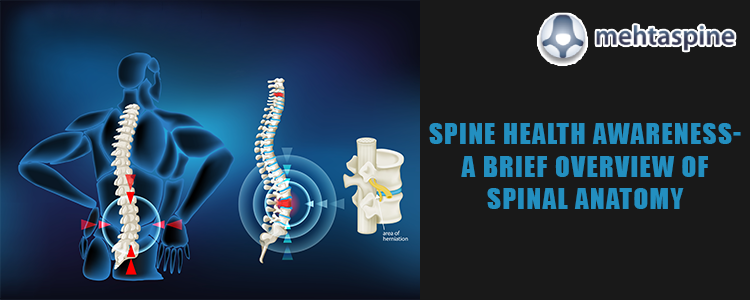Spine Health Awareness- A Brief Overview of Spinal Anatomy:
The spine is one of the most fascinating structures in the human body. It plays a crucial role in providing the body, as a stable structure while also housing and protecting the important nerves that are key to every basic body movements. So, naturally, an injury to the spine can result in serious problems that can significantly reduce the quality of life and when worsened can have a crushing impact on our daily functioning.
In this series of Spinal Health Awareness, we aim to provide complete information about Spine, its potential problems, disorders, disease and treatment options and more. And today’s blog is dedicated to a simple overview of the Spinal Anatomy to give you a basic idea about the structure of the spine. Read on:
Spinal Anatomy A Brief Overview
Human Spine that looks like a straight column from the backside is an S-shaped structure with three curves that are visible from sideways. The three spinal curves are naturally aligned for flexibility and even distribution of body weight. Though it is referred to as one single column of the spine, it is further divided three major segments characterised by the curves, namely Cervical Spine, Thoracic Spine & Lumbar Spine.
Spine – A Collection of Bones
This spinal column is a bony case that is made up of 24 small individual bones called vertebrae that are stacked up on top of each other. A gel-like disc acts as a cushion between these bones to absorb pressure and avoid them rubbing against one another. These vertebrae are held in place by other connective tissues called ligaments (connects bone to bone) and tendons (connects bone to muscle). And the facet joints link these vertebrae together to enable flexibility for physical movements.
All the vertebrae are numbered for classification and easy identification. A Cervical spine is a spinal segment that consists top 7 vertebrae from the neck (C1 to C7), Thoracic Spine are made up of next 12 vertebrae (T1 to T12) and lowest 5 vertebrae (Li to L5) is classified under Lumbar Spine. The total spinal column is hallow canal through which the spinal cord runs through, carrying a bundle of nerves. As the spinal cord runs through the canal, each nerve endings depart out of the column to their respective destinations to perform their functions.
Give the intricate build of the spinal column and versatile function of the spinal cord, any injury, disease or desired to any element of this spinal structure can cause a domino effect severely impacting other functions of the body.
Congenital spine conditions, spinal diseases & disorders, injuries or even degeneration due to common ageing cause problems to the spine and it is no wonder to know that everyone suffers from back pain at some point or other. While some spinal problems are easily treated and solved by orthopaedic spine specialist in UK, few spinal disorders like Scoliosis need diligent and careful treatment at the earliest to be successfully treated.
If you are looking for an expert paediatric spine specialist in the UK, you can contact Children and Adult Spinal Surgeon Mr Jwalant S. Mehta here: Clinical secretary: Samantha Leavy +44 785 021 1939


